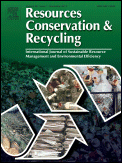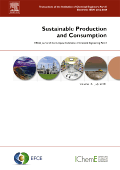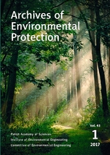
Waste Management
Scope & Guideline
Exploring cutting-edge methodologies in waste management.
Introduction
Aims and Scopes
- Waste Characterization and Management:
Research on the characterization of various types of waste, including municipal solid waste, industrial waste, and hazardous waste, is central to the journal's focus. Studies often explore the composition, generation rates, and potential recovery methods for these waste types. - Air Quality and Emissions Assessment:
A significant area of research involves the assessment and management of air quality, particularly related to emissions from waste management activities, such as landfills and incineration. This includes studies on particulate matter (PM), volatile organic compounds (VOCs), and other pollutants. - Sustainable Waste Treatment Technologies:
The journal highlights innovative technologies for waste treatment, including recycling, composting, anaerobic digestion, and waste-to-energy processes. Research often focuses on evaluating the efficiency and environmental impacts of these technologies. - Environmental Justice and Policy Analysis:
There is a growing emphasis on the social dimensions of waste management, including environmental justice issues and policy implications. Research often examines the disparities in waste management practices and their impacts on vulnerable communities. - Circular Economy and Resource Recovery:
The journal promotes research on circular economy principles, focusing on resource recovery from waste materials. This includes studies on recycling processes, waste minimization strategies, and the economic benefits of sustainable waste management.
Trending and Emerging
- Impact of Climate Change on Waste Management:
There is a growing body of research examining how climate change affects waste management practices and the implications for waste generation and treatment. This trend underscores the need for adaptive strategies in waste management systems. - Technological Innovations in Waste Treatment:
Emerging technologies, such as advanced recycling methods, biotechnological approaches for waste treatment, and IoT applications for waste monitoring, are increasingly featured in the journal, reflecting a shift towards more efficient and effective waste management solutions. - Public Health Impacts of Waste Management:
Research focusing on the public health implications of waste management practices, particularly in light of the COVID-19 pandemic, is on the rise. Studies assess the health risks associated with waste exposure and the effectiveness of management strategies in mitigating these risks. - Environmental Justice in Waste Management:
The integration of environmental justice considerations into waste management research is increasingly prominent, with studies addressing disparities in waste management impacts on marginalized communities. - Waste-to-Energy and Resource Recovery Systems:
The interest in waste-to-energy technologies and resource recovery systems is growing, as researchers explore the dual benefits of waste reduction and energy generation, aligning with sustainability goals.
Declining or Waning
- Traditional Landfill Practices:
Research on traditional landfill practices and their environmental impacts has seen a decrease, as attention shifts towards more sustainable alternatives like recycling and waste-to-energy technologies. - Incineration as a Waste Management Solution:
While incineration has historically been a key focus area, recent publications indicate a waning interest in this method, likely due to increasing scrutiny over emissions and public opposition. - Single-Use Plastics Management:
Research specifically targeting the management of single-use plastics has declined, possibly due to the increasing focus on broader circular economy strategies that encompass multiple waste streams.
Similar Journals

International Journal of Environmental Science and Technology
Bridging science and technology for a greener tomorrow.International Journal of Environmental Science and Technology, published by SPRINGER, stands as a premier platform for the dissemination of cutting-edge research in the fields of environmental science, technology, and engineering. With an impressive scope spanning from 2005 to 2024, this journal serves as a vital resource for academic and professional communities engaged in tackling pressing environmental challenges. It boasts a strong reputation, evidenced by its Q1 ranking in Agricultural and Biological Sciences and solid placements in Environmental Chemistry and Engineering. Researchers searching for high-impact studies will find the journal's contributions significant, as reflected in its rankings within Scopus: 34th percentile in Agricultural and Biological Sciences and notable standings in Environmental Engineering and Chemistry. Although the journal is not currently an Open Access resource, it maintains a commitment to academic rigor and innovation, making it indispensable for those devoted to advancing knowledge in environmental sustainability and technology.

Journal of Hazardous Materials Advances
Empowering sustainable practices through rigorous science.The Journal of Hazardous Materials Advances, published by ELSEVIER, is a premier open-access journal dedicated to advancing the understanding and management of hazardous materials. Established in 2021, this journal has quickly gained recognition, securing a place in the prestigious Q1 quartile across multiple categories, including Environmental Chemistry, Environmental Engineering, Health, Toxicology and Mutagenesis, Pollution, and Waste Management and Disposal. With its impactful research indexed under ISSN 2772-4166, the journal not only prioritizes quality but also promotes accessibility to its scholarly outputs, ensuring that vital findings are readily available to the global research community. As part of Scopus, the Journal ranks competitively in various subfields of Environmental Science, reflecting its vital role in addressing contemporary environmental challenges. Researchers, professionals, and students can rely on this journal to provide innovative insights and solutions in the ever-evolving landscape of hazardous material management and its implications for public health and environmental sustainability.

RESOURCES CONSERVATION AND RECYCLING
Advancing sustainable solutions for a greener future.RESOURCES CONSERVATION AND RECYCLING, published by Elsevier, is an esteemed journal that has been at the forefront of academic discourse since its inception in 1988. Focusing on the critical fields of resource management, recycling, and sustainability, this journal has established itself as a leading platform for innovative research, holding a prestigious position in the Q1 quartile for both Economics and Econometrics, and Waste Management and Disposal. With a remarkable Scopus ranking of #4 in its respective categories, it represents the pinnacle of scholarly contributions, aimed at fostering knowledge that drives efficient resource utilization and effective waste management practices. The journal's commitment to advancing the understanding of economic implications and environmental impacts of resource conservation is reflected in its diverse array of articles, case studies, and reviews. Although it is not an open-access journal, the valuable insights it offers are essential for researchers, professionals, and students who are dedicated to addressing pressing environmental challenges and enhancing sustainable practices on a global scale.

Sustainable Production and Consumption
Championing Environmental Stewardship through KnowledgeWelcome to Sustainable Production and Consumption, a premier journal published by Elsevier in the vibrant field of sustainability and environmental science. With an ISSN of 2352-5509, this journal has established itself as a leading platform for innovative research and discourse on sustainable manufacturing, consumption practices, and environmental technologies. As evidenced by its impressive 2023 rankings—Q1 in Environmental Chemistry, Environmental Engineering, Industrial and Manufacturing Engineering, and Renewable Energy, Sustainability and the Environment—the journal ranks among the top tier of its field. Researchers and professionals alike are invited to explore the journal’s rigorous peer-reviewed articles, which aim to advance the understanding and implementation of sustainable practices across various industries. With a strong commitment to disseminating impactful research, Sustainable Production and Consumption serves as an essential resource for academics, policy makers, and industry leaders seeking to address the challenges of modern environmental sustainability.

Archives of Environmental Protection
Exploring Solutions for Environmental ChallengesArchives of Environmental Protection, published by the Polish Academy of Sciences, is a pivotal journal in the field of Environmental Science. With an ISSN of 2083-4772 and E-ISSN of 2083-4810, this journal serves as a critical platform for disseminating innovative research and comprehensive reviews that address the complexities surrounding environmental issues. As of 2023, it holds a respectable Q3 ranking in Environmental Science, reflecting its relevance and contribution to the academic community, indicated by a Scopus rank of 124 out of 233 in the General Environmental Science category. Although it operates without Open Access, the journal's consistent publication from 2007 to 2024 emphasizes its commitment to advancing knowledge in diverse areas of environmental protection. Researchers, professionals, and students are encouraged to engage deeply with the wealth of insights offered through the rigorous peer-reviewed articles presented in this journal, which strive to foster sustainable practices and environmental stewardship.

Pollution
Fostering collaboration for a sustainable future.Pollution is a distinguished open-access journal published by UNIV TEHRAN, dedicated to advancing the understanding of environmental science and the multifaceted aspects of pollution research. Since its establishment in 2015, the journal has been committed to disseminating high-quality, peer-reviewed articles that address the pressing issues of environmental degradation globally. With an impact factor and a Scopus rank that places it within the top tier of Environmental Science (Rank #141/233), Pollution serves as an essential resource for researchers, professionals, and students alike. The journal encompasses a wide range of topics, including the sources, effects, and mitigation strategies related to various forms of pollution, thereby aiming to contribute significantly to the scientific community's efforts in promoting environmental sustainability. Its innovative and timely approach positions Pollution as a vital platform for sharing knowledge and fostering interdisciplinary collaboration in the environmental science domain.

JOURNAL OF THE AMERICAN LEATHER CHEMISTS ASSOCIATION
Fostering innovation in the leather industry.JOURNAL OF THE AMERICAN LEATHER CHEMISTS ASSOCIATION, published by the American Leather Chemists Association, serves as a cornerstone for research and development in the leather industry. With an ISSN of 0002-9726, this journal has been disseminating valuable findings since its first publication in the late 1960s, continuing through 2024. Despite being categorized within the Q4 quartile in fields such as Chemical Engineering, Chemistry, and Materials Science, it plays a crucial role in fostering innovation and addressing challenges faced by professionals in leather chemistry and technology. Researchers and practitioners alike will find an array of studies and discussions that bridge theoretical research and practical applications. Although not an open-access journal, it prioritizes accessibility and aims to keep pace with emerging trends in leather science, ensuring that it remains relevant in an evolving marketplace. Whether you are a seasoned professional or a budding student, this journal is indispensable for advancing your understanding of leather chemistry.

BIODEGRADATION
Exploring the intersection of microbiology and environmental health.BIODEGRADATION is a leading academic journal published by Springer that focuses on the interdisciplinary study of the degradation of organic compounds and its implications for environmental health and sustainability. Operating since 1990, BIODEGRADATION has established itself as a pivotal resource in the fields of bioengineering, environmental chemistry, environmental engineering, microbiology, and pollution management, currently ranking in the Q2 quartile across these categories as of 2023. With an ISSN of 0923-9820 and an E-ISSN of 1572-9729, the journal disseminates high-quality, peer-reviewed research, engaging both seasoned researchers and emerging scholars interested in the mechanisms and applications of biodegradation processes. While the journal operates under a subscription model, it continues to attract significant interest due to its comprehensive coverage of innovative methodologies and critical analysis of biodegradation pathways and their environmental significance. As a beacon in its field, BIODEGRADATION not only addresses contemporary issues in environmental science but also fosters academic conversation and collaboration amongst researchers globally, making it an indispensable asset for those dedicated to advancing sustainability practices.

ENVIRONMENTAL ENGINEERING SCIENCE
Bridging science and practice for a healthier environment.ENVIRONMENTAL ENGINEERING SCIENCE is a leading journal published by MARY ANN LIEBERT, INC that provides a platform for pioneering research in the fields of environmental chemistry, pollution control, and waste management. With an ISSN of 1092-8758 and an E-ISSN of 1557-9018, this peer-reviewed journal aims to disseminate high-quality scientific studies that address critical environmental challenges. As evidenced by its 2023 category quartile rankings, it holds a notable position at Q3 in Environmental Chemistry and Pollution and Q2 in Waste Management and Disposal, highlighting its relevance and impact in these domains. Spanning over two decades from 1997 to 2024, the journal is dedicated to fostering innovations and promoting rigorous scholarship that can contribute significantly to sustainable environmental practices globally. Authors and researchers are encouraged to engage with this essential resource, which offers Open Access options to enhance the visibility and reach of their work. For those interested in advancing their understanding and practice within the environmental sciences, ENVIRONMENTAL ENGINEERING SCIENCE is an indispensable journal to consider.

Recycling
Exploring cutting-edge research in waste management.Recycling is a renowned international open access journal published by MDPI that has been dedicated to advancing the field of recycling and waste management since its inception in 2015. With a focus on innovative technologies, management practices, and policy frameworks, this journal serves as a platform for researchers, professionals, and students who are eager to explore sustainable solutions in resource recovery and material efficiency. Based in beautiful Basel, Switzerland, Recycling boasts an impressive impact with a 2023 ranking of Q2 in Management, Monitoring, Policy and Law and Q1 in Materials Science (Miscellaneous), signifying its pivotal role in driving forward-thinking research in these critical areas. The journal is indexed in Scopus, with strong performance metrics highlighting its relevance and quality, such as a rank of #42 in Waste Management and Disposal. As an open access publication, Recycling promotes the dissemination of knowledge, ensuring that groundbreaking research is freely available to a global audience. Whether you are a seasoned researcher or a student eager to contribute to the discourse surrounding sustainable practices, Recycling provides a vital resource for those committed to the future of waste management and environmental sustainability.